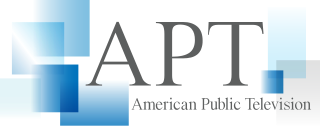Public-access television is traditionally a form of non-commercial mass media where the general public can create content television programming which is narrowcast through cable television specialty channels. Public-access television was created in the United States between 1969 and 1971 by the Federal Communications Commission (FCC), under Chairman Dean Burch, based on pioneering work and advocacy of George Stoney, Red Burns, and Sidney Dean.

WGBH-TV, branded GBH or GBH 2 since 2020, is the primary PBS member television station in Boston, Massachusetts, United States.

American Public Television (APT) is an American nonprofit organization and syndicator of programming for public television stations in the United States. It distributes public television programs nationwide for PBS member stations and independent educational stations, as well as the Create and World television networks.

KLCS is a tertiary PBS member television station in Los Angeles, California, United States. Owned by the Los Angeles Unified School District (LAUSD), it is one of eight television stations in the U.S. that are operated by a local school system. KLCS' studios are located at the former Downtown Magnets High School campus on West Temple Street in downtown Los Angeles, and its transmitter is located atop Mount Wilson.

KLVX, branded Vegas PBS, is a PBS member television station in Las Vegas, Nevada, United States. It is the flagship outlet of the KLVX Communications Group, a subsidiary of the Clark County School District. KLVX's studios are located at the Vegas PBS Educational Technology Campus in Paradise, and its transmitter is located atop Black Mountain, near Henderson.

WETA-TV is the primary PBS member television station in Washington, D.C. Owned by the Greater Washington Educational Telecommunications Association, it is a sister station to NPR member WETA. The two outlets share studios in nearby Arlington, Virginia; WETA-TV's transmitter is located in the Tenleytown neighborhood in Northwest Washington.

WNYE-TV is a non-commercial independent television station in New York City. It is operated by NYC Media, a division of the Mayor's Office of Media and Entertainment, alongside public radio station WNYE. The two stations share studios at the City University of New York's Graduate Center in Midtown Manhattan, while WNYE-TV's transmitter is located at 4 Times Square.

South Carolina Educational Television is a state network of PBS member television stations serving the U.S. state of South Carolina. It is operated by the South Carolina Educational Television Commission, an agency of the state government which holds the licenses for all of the PBS member stations licensed in the state. The broadcast signals of the eleven television stations cover almost all of the state, as well as parts of North Carolina and Georgia.
Arkansas PBS is a state network of PBS member television stations serving the U.S. state of Arkansas. It is operated by the Arkansas Educational Television Commission, a statutory non-cabinet agency of the Arkansas government operated through the Arkansas Department of Elementary and Secondary Education, which holds the licenses for all of the public television stations based in the state. The commission is managed by an independent board of university and education officials, and gubernatorial appointees representing each of Arkansas's four congressional districts. Along with offering television programs supplied by PBS and various independent distributors, the network produces public affairs, cultural and documentary programming as well as sports events sanctioned by the Arkansas Activities Association (AAA).
KVZK-TV is the public government-owned broadcaster of the U.S. territory of American Samoa, based in Pago Pago. A subsidiary of the Office of Public Information, currently directed by Tialuga Vince Iuli, it was established in 1964. KVZK-TV broadcasts from the National Register-listed Michael J. Kirwan Educational Television Center in Utulei and maintains a tower on Mount Alava.
The Annenberg Foundation is a family foundation that provides funding and support to non-profit organizations in the United States and around the world. Some of the Foundation's core initiatives are the Annenberg/Corporation for Public Broadcasting (CPB) project, which funds many educational television shows broadcast on Public Broadcasting Service (PBS) public television in the United States as well as The Annenberg Community Beach House, The Annenberg Space for Photography, Metabolic Studio, explore.org, Wallis Annenberg PetSpace and the Wallis Annenberg Center for Performing Arts.
Educational television or learning television is the use of television programs in the field of distance education. It may be in the form of individual television programs or dedicated specialty channels that is often associated with cable television in the United States as Public, educational, and government access (PEG) channel providers. There are also adult education programs for an older audience; many of these are instructional television or "telecourse" services that can be taken for college credit, such as the Open University programs on BBC television in the UK.
The Agency for Instructional Technology (AIT) was a non-profit organization in the United States that produced, sold and distributed educational and instructional television programs, and other multimedia materials, to schools in the United States and Canada.
The Educational Broadband Service (EBS) was formerly known as the Instructional Television Fixed Service (ITFS). ITFS was a band of twenty (20) microwave TV channels available to be licensed by the U.S. Federal Communications Commission (FCC) to local credit granting educational institutions. It was designed to serve as a means for educational institutions to deliver live or pre-recorded Instructional television to multiple sites within school districts and to higher education branch campuses. In recognition of the variety and quantity of video materials required to support instruction at numerous grade levels and in a range of subjects, licensees were typically granted a group of four channels. Its low capital and operating costs as compared to broadcast television, technical quality that compared favorably with broadcast television, and its multi-channel per licensees feature made ITFS an extremely cost effective vehicle for the delivery of Educational television materials.
The Midwest Program on Airborne Television Instruction (MPATI) was a special broadcasting initiative designed to broadcast educational television programming to schools, especially in areas where local educational television stations are either difficult to receive or unavailable. From 1961 through 1968, MPATI's programming broadcast from two DC-6AB aircraft based at the Purdue University Airport in West Lafayette, Indiana, using a broadcasting technique known as Stratovision.
K45AR was a low-power television station in Eagle Bend, Minnesota, United States. It started in the late 1970s under the call sign KXG2CB, then transmitting on a 100-watt transmitter under an experimental license from the FCC. K45AR was used for the first educational instructional television (ITV) system in the state. The station was run by the schools of Bertha–Hewitt, Clarissa, and Eagle Bend.
Community television is a form of mass media in which a television station is owned, operated or programmed by a community group to provide television programs of local interest known as local programming.

The South Carolina Department of Education is the state education agency of South Carolina. It is headquartered in Columbia at the Rutledge Building. The agency is overseen by an elected Superintendent of Education, currently Ellen Weaver. Previous Superintendents have included Molly Spearman, Hugh S. Thompson, Mick Zais, Jim Rex, and Inez Tenenbaum.
KET ED, known as the Education Channel, was a digital television programming service operated by PBS member network Kentucky Educational Television. The service provided programming from the Annenberg/CPB project, along with encore presentations of some PBS programming, and much of KET's locally produced in-house instructional television (ITV) productions.
The Kentucky Channel, also known by its Program and System Information Protocol short name and on-screen logo bug as KET KY, is a full-time 24/7 statewide digital television programming service originating from PBS member state-network Kentucky Educational Television. The channel features programming related to the U.S. state of Kentucky, as well as coverage of Kentucky General Assembly when it is in session.







